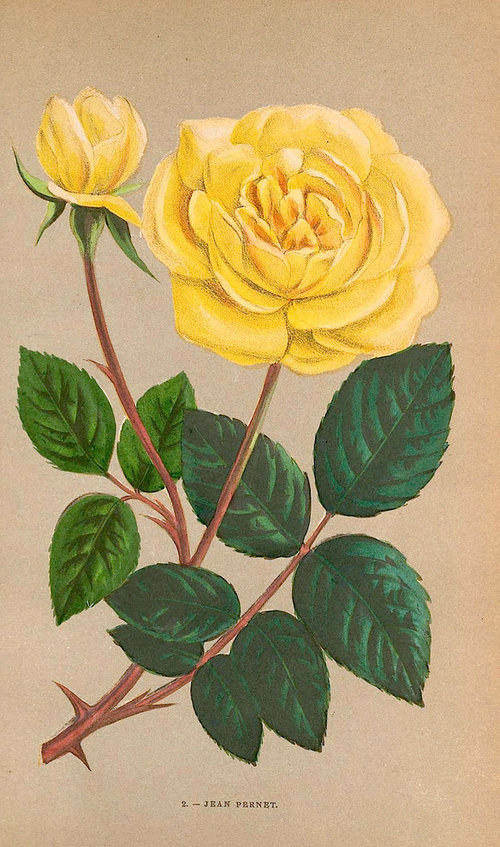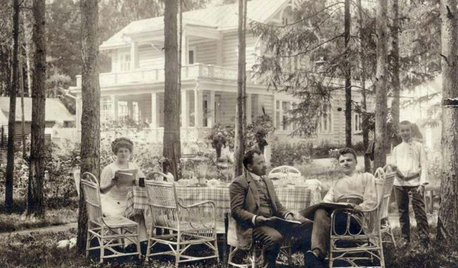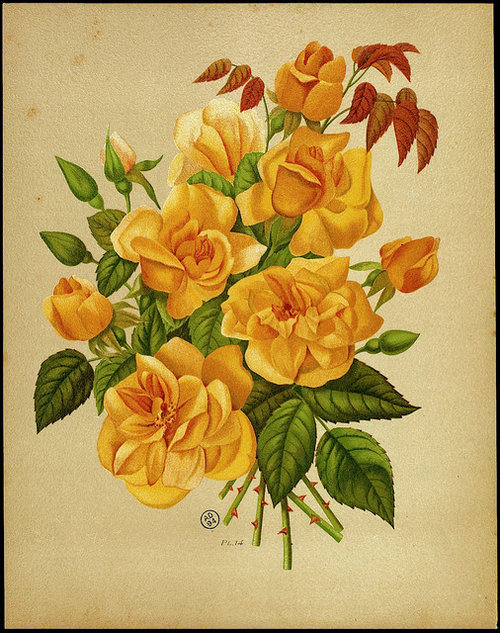From The Garden, November 26, 1892, p.478:
ROSE NOTES.
There are many Roses which vary so much in the colour of their blooms and also in habit of growth when growing in different localities, that I am often hearing from amateur friends who complain of the way some of our very best Roses for general cultivation thrive or behave with them. A short time ago "A. H." gave some interesting notes on the supposed deterioration of some Roses. May it not be that many of these instances are due to some of the same causes as those affecting varieties in certain districts? I suppose scarcely any rosarian of experience would consider that that grand Tea Rose Comtesse de Nadaillac was deteriorating. Yet if he had been used to see this variety growing in the extra vigorous and luxuriant manner that I have recently received some wood both from correspondents in Ireland and Scotland, and then saw it as it generally grows, I have no doubt he would consider it was falling off.

Horace Vernet as grown by Mr, E. Mawley is a grand all-round Rose. With me and many more it is of little use except for exhibition, and from at the most a two-year-old plant, dying after this age.
How very much some Roses vary may be noticed by a visit to a few gardens where these are grown largely. You will seldom find the same variety taking so prominent a position in all. I know a garden where Pierre Notting is considered the finest of all. Did I not know the variety is true to name, I should be inclined to the opinion it was not this Rose at all, so well do the plants grow and flower compared to any of this Rose growing with me or that I have seen elsewhere.

In connection with this subject I may mention the notes from Mr Grahame upon Edith Giffard. That gentleman says it is the best grower and most satisfactory Tea Rose he has in his garden. He also styles the flowers as large, not even mediutn sized. My observations go to prove that this is the exception in other gardens. Edith Giffard with me is a grand Rose, but not the most satisfactory in either of the attributes Mr. Grahame claims for it. That grand old Rose Dr. Andry used to be a great favourite of mine when grown on a certain piece of ground; but where it is now grown, it does not at all please me. The same may be said of Senateur Vaisse and Xavier Olibo, both of which have never been good with me except upon one piece of ground. Marie Baumann and Alfred Colomb are by some so nearly alike as to be almost, if not quite, synonymous. Now with me there are not two more distinct red Roses as a general rule; but one may occasionally cut blooms of each that can hardly be distinguished. Charles Wood, an old Rose that was a great favourite of mine, has now entirely disappeared from my stock. It was sent out by Portemer in 1865, and was one of the best growers and freest bloomers among deep purplish-crimson Roses. I do not find it in any English Rose catalogue now, but it will alwavs remain in my memory as one of our best shaped Roses, and quite worthy of continued cultivation where it will grow as it used to do with me. Jean Pernet in a former garden was always good- in fact, I there considered it the best yellow Tea, but it is an indifferent Rose where now grown.

I think we often look upon a certain Rose as having deteriorated for the reason that it does not thrive so well in fresh quarters. Then we are constantly advancing in the improvement of Roses through new varieties, and when these happen to be of the same shade of colour as an old favourite, we naturally look upon it as somewhat eclipsed and fallen off.
On the other hand, there are many Roses which certainly seem to improve. Take A. K. Williams, for instance. When first introduced it was styled a bad grower by almost all who saw it. Now, however, there would be few give it this character.
The Bride also was with many a very disappointing Rose during the first few years of its introduction to the public. W. A. Richardson, too, did not take the Rose world by storm nearly so much as one would imagine from its present and deservedly popular position.
Just as some varieties of fruits do much better in certain districts, so, too, do many of our Roses. General Jacqueminot, Mrs. John Laing, and a few more are notable exceptions, and probably we could count the sorts on our fingers that will do as well in all districts as these two grand Roses. —Ridgewood.
















User
VicissitudezzOriginal Author
Related Discussions
Origins of Marie Pavié?
Q
Venetian plaster diary entry with photos
Q
Update on Earth Angel rose
Q
Can plants die from excessive heat? Need some advice pls
Q
nikthegreek
VicissitudezzOriginal Author
roseseek